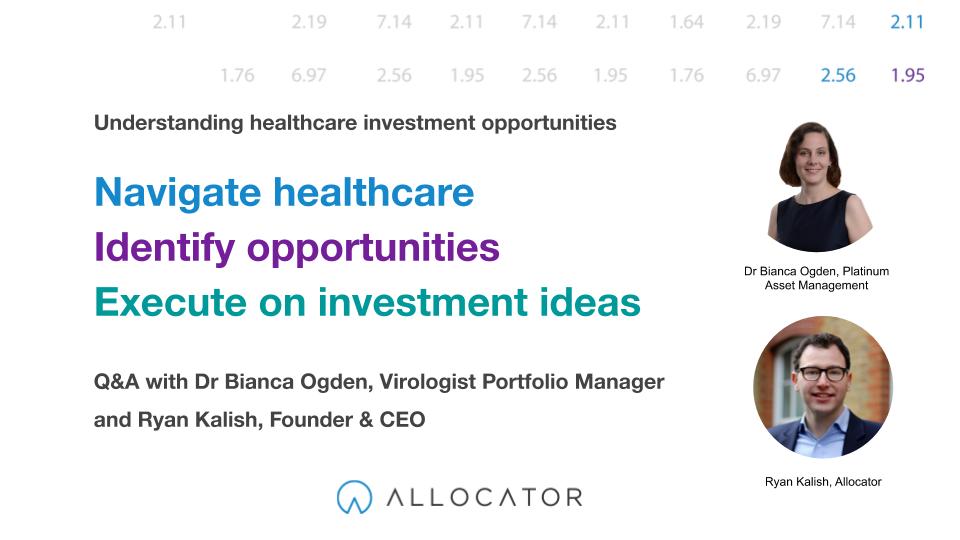
Assessing opportunities in Healthcare: Q&A with Dr Bianca Ogden
2020 has proven to be a volatile year for investment managers due to COVID-19. The emergence of new biotech and healthcare companies have tested sector specialist strategies even more than before.
On the 21st of October 2020, we had the privilege of hosting Dr Bianca Ogden, Virologist Portfolio Manager at Platinum Asset Management to share their approach to finding quality companies in Healthcare and Biotech.
In this exclusive Q&A, Dr Ogden shares her insights into what to look for in healthcare investments, in clinical trials and companies with the highest potential for growth, including biotech specialists. Also, Ryan Kalish, Founder and CEO, discusses how Allocator, a software and data as a service company, helps investors and managers navigate these volatile markets with clear purpose and insight into their existing fund investments.
For a more in-depth review on the investment opportunities discussed, you can watch Dr Ogden’s and Ryan’s full presentation HERE.
We hope you enjoy the Q&A with Dr Bianca Ogden and Ryan Kalish.
Question
Regarding the clinical trial process, at what stage do you think one should think about investing?
Dr Bianca Ogden
Some people say when the drug is approved, but interestingly, excitement tends to be before that, i.e. when there's anticipation on what's to come. In my view, it is essential to look into opportunities where they are at present or catalysts that haven't happened yet. There's no easy way to determine at what stage of a clinical trial one should invest as everything in this business can fall off at any stage. In the end, it's all about anticipation.
So, if everyone already knows the story and the company, it might not be the right time to invest as those investments are often at a premium. However, there's no right or wrong - it's more about where the heat is coming from and discovering something new.
Question
Which of the areas in healthcare are creating the most investment opportunities?
Dr Bianca Ogden
Given the current situation, there’s lots of focus on vaccines for Covid-19, including tools and manufacturing. That also applies to biotech companies, as many of them are now testing Covid-19 related drugs.
There are also plenty of other good companies that are not in this space. For example, genomics firms might come up with something new, and there’s always acquisitions in that field that can also present investment opportunities. Also, companies that are building different databases might be worth looking into.
It’s worth bearing in mind that if you are a generalist with less knowledge of the healthcare sector investments you might feel more comfortable looking into investing in tool-based companies as there often less risk associated than with drug-related firms.
Question
Given that the healthcare sector is a complex industry and investment opportunities might be hard to find, how can Allocator help investors research and analyse trends and opportunities?
Ryan Kalish
We have a lot of healthcare funds that report to Allocator, and also tools for screening and importing data from external sources. For investors who are already using our platform, we enable them to monitor exposures, format aggregation and PDF indexing. So, our platform allows them to search firms, stocks and conversations from tens of thousands of PDFs across the healthcare sector.
For those investors with less experience in healthcare investments, the Allocator platform provides a single source of truth in an easy-to-analyse format for finding new ideas and building a research process around specialist sectors. As there’s one central repository for fund documents it allows investors to re-verify and analyze up-to-date manager reported data from its source.
Question
With minimal information upfront, how do you assess that probability of success?
Dr Bianca Ogden
It’s about the experience and being able to read the market as healthcare is a complex sector. I have a 3D map in my mind where evaluations sit. In the end, I would not get too bogged down about some of the valuations, e.g. earnings or enterprise valuation to sales. If a drug or a tool is successful, you can never imagine how big these firms can get and how people get excited about them. To me, it’s much more about understanding whether the company has a solid plan, looking at their cash flow and how they are allocating the capital.
Some people analyse TAM. I don’t do that as it clouds my valuation. Instead, I try to make my mind and see how the company I’m interested in is progressing. In terms of drugs, I tend to know the ballpark figure, e.g. to a cancer drug, so that helps.
Question
You mentioned biotech was becoming "less binary". How many of the companies are revenue-generating today versus more binary?
Dr Bianca Ogden
Many biotech’s do not generate product revenues today. However, many enter into alliances and receive upfront payments, at times R&D funding and over time milestone payments. Larger biotech’s that have $1-2b in sales are profitable, but some choose to build out their pipeline. Hence R&D spending prevents them from being profitable. I argue that continued R&D spending is essential to become a long-term success and to balance out the binary risk.
For deeper insights, watch Dr Bianca Ogden’s presentation HERE. If you are looking for an analytics and portfolio management platform that provides you with seamless access to a broad range of private markets data, feel free to contact us HERE.
